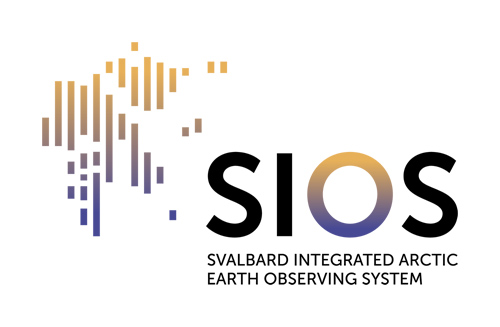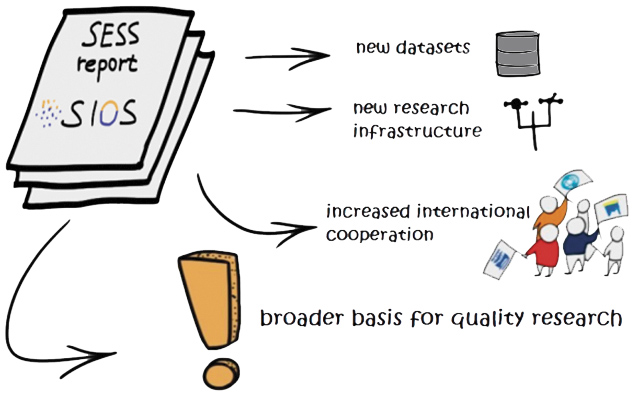 The Svalbard Integrated Arctic Earth Observing System (SIOS) is a consortium of international institutions with research infrastructure in and around Svalbard. SIOS is building an integrated observing system for long-term measurements addressing Earth System questions. SIOS publishes an annual State of Environmental Science in Svalbard (SESS) report. The first issue was released in January 2019. The editorial board consists of five persons, two of which are senior researchers from SIOS member institutions and two are from the SIOS Knowledge Centre. SIOS would like to appoint an early career scientist as fifth member of the editorial board. Apply no later than 30 May 2020.
The Svalbard Integrated Arctic Earth Observing System (SIOS) is a consortium of international institutions with research infrastructure in and around Svalbard. SIOS is building an integrated observing system for long-term measurements addressing Earth System questions. SIOS publishes an annual State of Environmental Science in Svalbard (SESS) report. The first issue was released in January 2019. The editorial board consists of five persons, two of which are senior researchers from SIOS member institutions and two are from the SIOS Knowledge Centre. SIOS would like to appoint an early career scientist as fifth member of the editorial board. Apply no later than 30 May 2020.
The report summarises the state of current knowledge of key Earth System Science parameters and analyses how these parameters influence one another. The SESS report outlines the work that has been done in the previous year within the SIOS cooperation to optimise the observing system and recommends research priorities for the following year(s).

The tentative timeline for the third issue of the SESS report is as follows:
• Early May: Decision on proposal funding
• 5 June: First editorial board meeting
• 10 June: Online workshop with authors and editorial board
• 15 September: Submission of contributions
• Beginning of December: Final report The SESS report 2020 will be released during the Polar Night Week in Longyearbyen, 11-15 January 2021.
The editorial board consists of five persons, two of which are senior researchers from SIOS member institutions and two are from the SIOS Knowledge Centre. We would like to appoint an early career scientist as fifth member of the editorial board.
The tasks of the editorial board are:
• review received contributions
• invite additional contributors
• organise an scientific review process
• merge all contribution to a coherent report (synthesis work, write the executive summary)
• prepare the SESS report release
• prepare promotion material The editorial board works in close cooperation with scientific and communication advisors within the SIOS community.
Applicants should:
• have an education background within Earth System Science
• have an interest in editorial activities
• be an active team player
• be fluent in oral and written English We offer an excellent opportunity
• to gain insight in the editorial work of scientific reports
• to influence the development of the SESS report
• to build a network with researchers from diverse fields of arctic research within Earth System Science.
The applicant is expected to attend approx. 7 board meetings (on video), the workshop (10 June), and the Polar Night Week in Longyearbyen (11-15 January 2020, depending on travel restrictions due to the COVID-19 pandemic). Travel costs will be refunded.
The time period of appointment to the editorial board is limited to the completion of the third issue of the SESS report (January 2021). The application and selection process is coordinated by APECS. If you are interested, please send the following information by no later than 30 May 2020 to This email address is being protected from spambots. You need JavaScript enabled to view it.:
• CV
• Statement of interest (max one page), including o your research background o your motivation in joining the editorial board for the SESS report o your thoughts on how you could contribute to the editorial work and how this work would be beneficial for your career.
If you have questions about the position, please contact SIOS directly at This email address is being protected from spambots. You need JavaScript enabled to view it.
Statement from the early career member of the editorial board in 2019:
Working as an early career researcher on the editorial board for the SESS report has been an incredible experience that I would strongly recommend to anyone. Activities included some help and guidance to the authors for the writing of the chapters, communication with authors and reviewers, proofreading, decision-making, writing of the executive summary and the final presentation of the report during the polar night week. The members of the editorial board and the SIOS-KC are also very open on welcoming of any additional skills and ideas that you may bring to the table, which really gives you many opportunities to contribute (and perhaps more than in other reports). Because you are involved in all the stages of the report, it gives invaluable insights into how a scientific report is created. Since you work so closely with the content of the report, it also gives a very nice overview of what the latest developments and advances are in Earth System Science and research on Svalbard. Statement from the early career member of the editorial board in 2018: I served as the early-career member of the editorial board for the ‘State of Environmental Science for Svalbard’ report in 2018. I was interested in gaining some editorial experience, and this was an excellent opportunity to do so. My initial responsibilities were to assist in the design and production of official report documentation, recruit and liaise with the reviewers of each report chapter, and regularly update the contributing authors of upcoming deadlines and progress of the report. Each member of the editorial board was also responsible for reviewing, providing author feedback, and editing several of the report chapters. I also designed some visual aides that have been used in presentations at national and international conferences, promoting the SESS report. I learnt an incredible amount from the senior members of the editorial board and the SIOS-KC staff, who were enthusiastic, accommodating and extremely helpful. I was fortunate enough to attend and deliver a presentation at the SIOS Polar Night Week at the SIOS Knowledge Center in Longyearbyen, in January 2019. This was a fantastic experience, one where I was able to meet the report's contributing authors and the wider research community. Not only has this process broadened my own knowledge of the earth system science currently being conducted in Svalbard, but it has also given me a valuable insight into the process of editing and publishing a scientific report. For any early career scientists who wish to gain some editorial experience, I would strongly recommend that they apply to join the 2019 editorial board. I have gained knowledge and skills that have already proven invaluable within my own research and broader career.